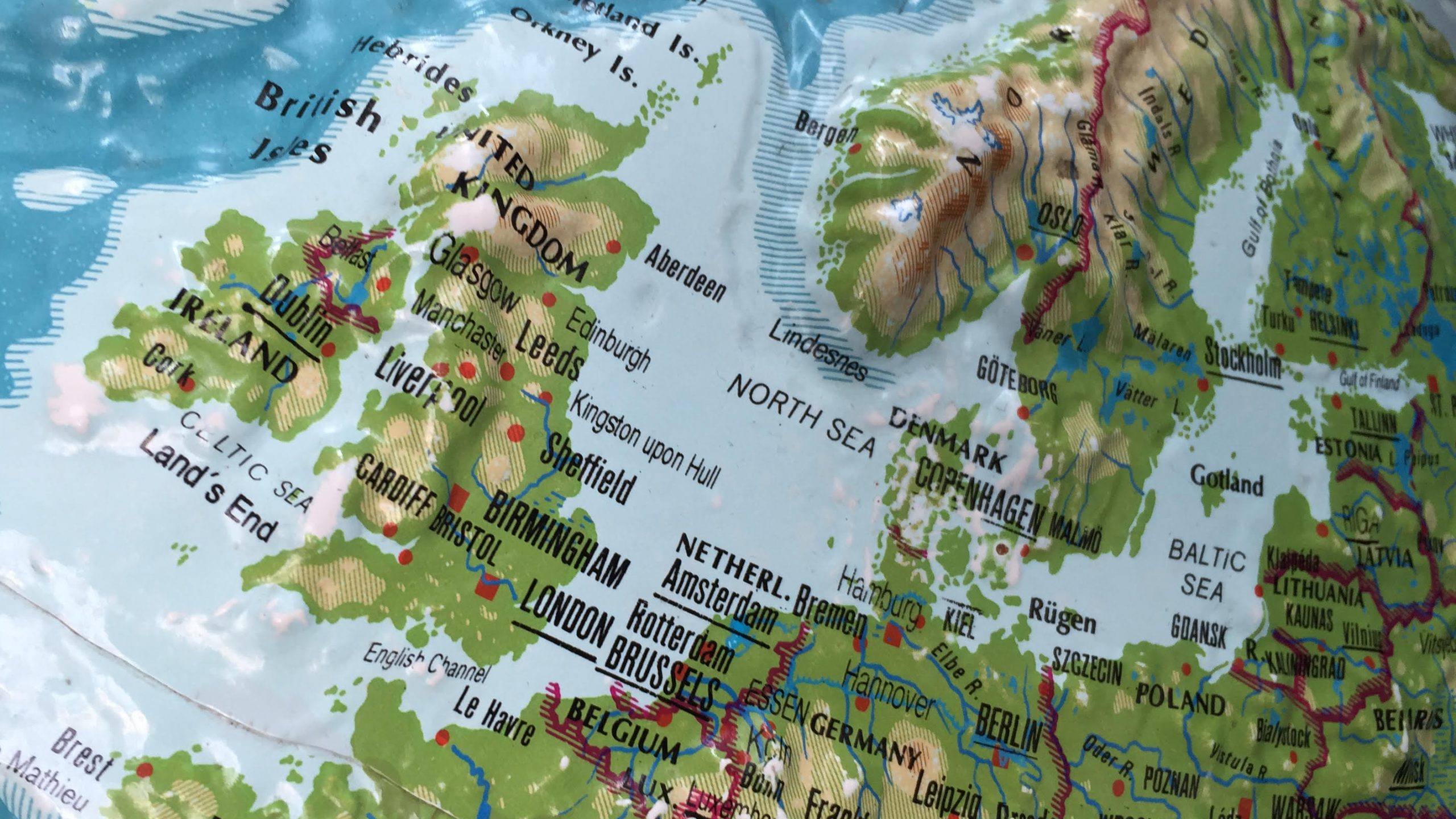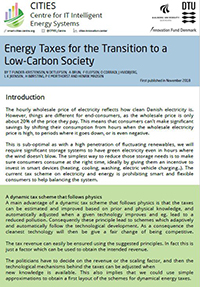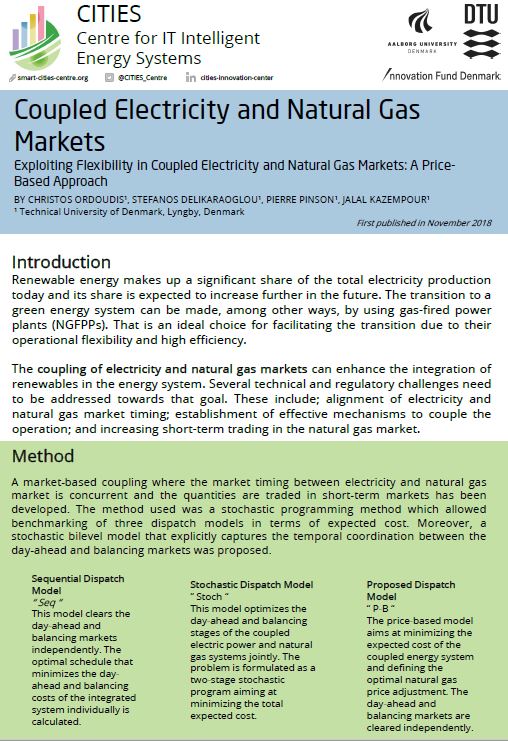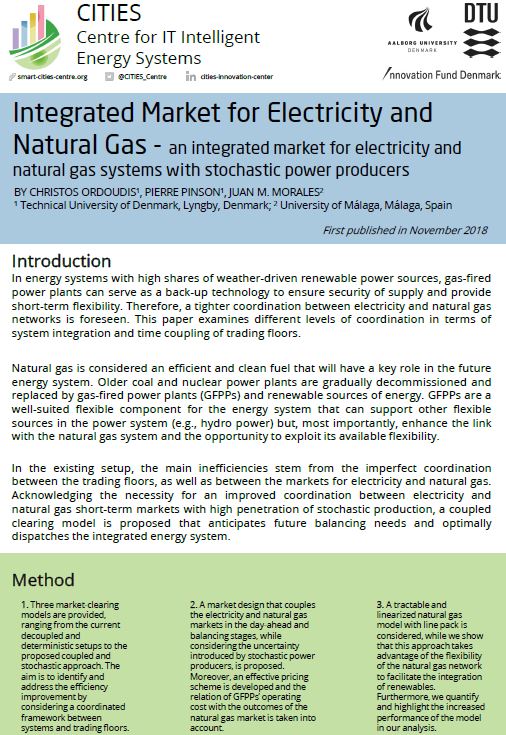Markets
CITIES has conducted research on the topic of markets to ease the large scale integration of renewable energies into power systems and electrical markets. The findings are mainly related to the application of mathematical modelling and decision-making methods to the energy sector, based on stochastic process modelling, forecasting, optimization and decision-making under conditions of uncertainty.
The CITIES partners have defined five recommendations for this topic:
Coordination of energy markets (heat, gas and electricity) should be further rethought, so they harness flexibility and reward those providing it; Market designs should be thought of in a more flexible manner to allow for a wealth of alternative business models; Future markets should readily accommodate the uncertainty and variability of renewable energy generation, storage, flexibility and decentralization – this requires new advances in the theory of markets; New methods for describing the flexibility can be implemented in control solutions as an operational alternative to low-level markets; The role of technical aggregators in energy markets should be considered and investigated.
Learn more in the list below and see the videos.
Future Electricity Markets
At CITIES final conference November 9, 2020, talked Pierre Pinson, Professor, DTU Elektro and Work Package Manager at CITIES, about markets for integrated energy systems and consumers-centric and community-driven electricity markets with energy communities. Flexibility and uncertainty components need to be better modelled and accommodated in coupling of markets for electricity, gas and heat. An increased decentralization of our energy system may require rethinking electricity markets based on energy communities and peer-to-peer concepts.
Suggestions for new energy taxes and net tariffs
At CITIES final conference November 9, 2020, CITIEs Task Force group represented by Nina Detlefsen, Chief Analyst at Green Energy – Danish District Heating Association and Jan Hvidbjerg, Lead Analyst at Ørsted talked about the work with energy taxes and net tariffs. A well-designed price signal for end users will make them change their behavior, just as energy taxes should be linked to the current local load in the electricity grid.
Market-Based Mechanisms for Mobilizing Electric Demand Flexibility
At CITIES final conference Shmuel Oren, Professor, University of Berkeley, California, US talked about market-based mechanisms for mobilizing electric demand flexibilityand with slides from Niclas Brok, PhD student, DTU Compute.
Simulation and planning for the smart energy system
At CITIES final conference Karl Sperling, Associate Professor and Work Package Manager on CITIES, Jakob Zinck and Louise Krog Elmegaard Mouritsen, Post Doc, Department for Development and Planning at Aalborg University talked about the research in developing long term simulation platform for system planning. Louise has also looked at barriers and recommendation for innovative models for wind power.
Recommendations
-
Coordination of energy markets (heat, gas and electricity) should be further rethought, so they harness flexibility and reward those providing it
It is important that also the interplay of the energy markets facilitate sector coupling and flexibility in order to exploit the benefits and synergy effects of an integrated energy system. The market should be set up in a way that actors providing flexibility to the system are rewarded. -
Market designs should be thought of in a more flexible manner to allow for a wealth of alternative business models
To increase the share of green energy and flexibility, alternative business models such as involving aggregators and energy communities should be considered. Aggregators consolidate decentralized energy consumers or producers to act on the market on behalf of them including trading the consumers flexibility. Energy communities organize local (often renewable) energy production and consumption to the environmental, economic or social advantage of their members. -
Future markets should readily accommodate the uncertainty and variability of renewable energy generation, storage, flexibility and decentralization - this requires new advances in the theory of markets
The current energy markets are designed for an energy system where the energy production is scheduled according to the energy demand. This concept must be questioned since with increasing share of intermittent renewable energy production, uncertainty, variability and decentralization is added to the production side. New market concepts have to consider this aspect to improve the overall energy system performance. -
New methods for describing the flexibility can be implemented in control solutions as an operational alternative to low level markets
We have developed methods for describing the flexibility of e.g. a building or a wastewater treatment plant. These methods can be used to generate price-based control signals for controlling e.g. the peak consumption in DSO areas. -
The role of technical aggregators in energy markets should be considered and investigated
It has been concluded that the optimal flexibility can be achieved if the aggregators are experts within their field of operation, and for instance it might be advantageous to have experts in wastewater treatment to act as a special aggregator for flexibility related to wastewater treatment.
Solutions/methodologies
-
Tool for simulating occupancy profiles for private households
ProccS.org is a tool for simulating occupancy profiles for private households. The application creates occupancy profiles for bathroom, kitchen, living room and bedrooms. The profiles can be downloaded in csv-format. - There is a need for better coordination between energy systems locally, regionally and nationally in order to take advantage of sectoral coupling between energy systems
Demo projects
Dynamic prices for heat delivered to district heating systems
This demo project has studied the dynamic value of heat supplied to the district heating system. Many of the methods used and the obtained results could also be used in a study on the demand side.
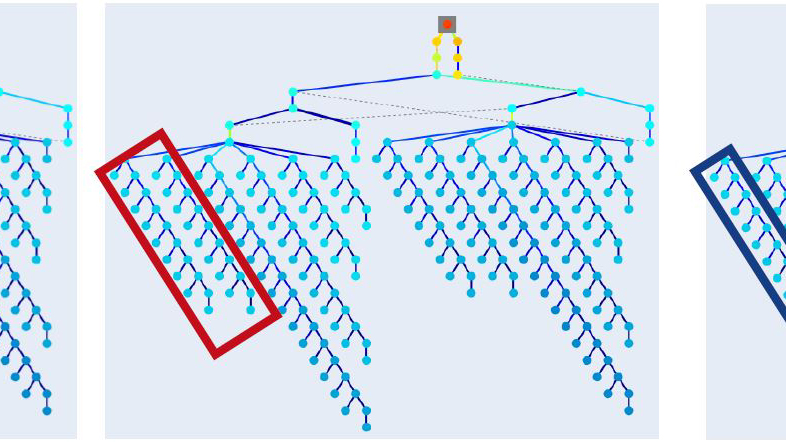
Qualitative investigation of the impact of energy communities on distribution grids
The demo project has made a simple analysis of the impact of energy communities on three different grid layouts: urban, suburban and rural areas of Denmark to estimate consequences of different setups of energy communities on distribution grids.

